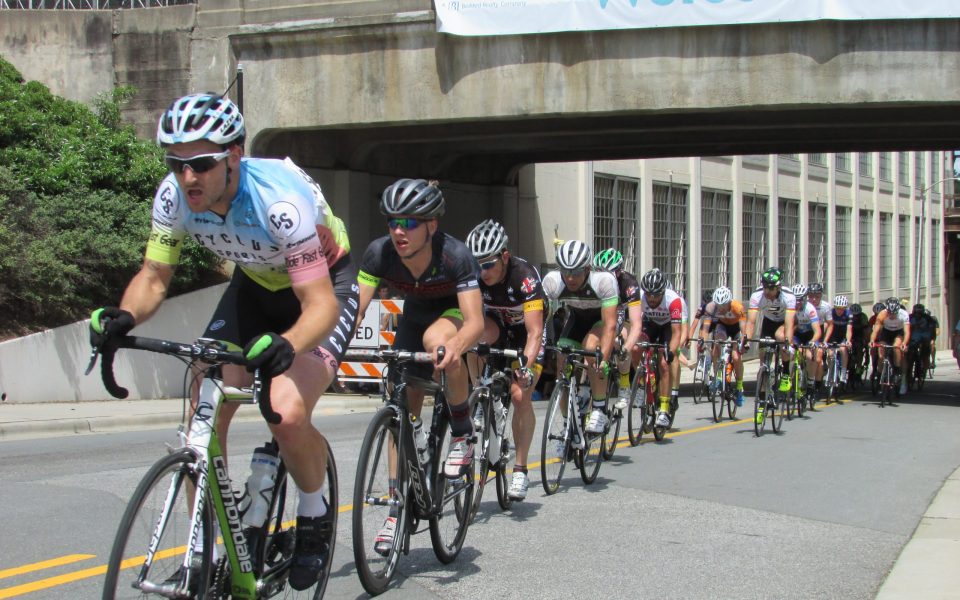A whistle blew. Cowbells ding-a-linged. A few dozen cyclists stormed up Fifth Street towards Patterson Avenue in downtown Winston-Salem.
The Men’s Category 1 and 2 amateur criterium of the Winston-Salem Cycling Classic had begun.
The clump of cyclists flashed by. In the matter of only a minute, they dashed by again.
And again. And again.
Repeat for 75 minutes.
I realized quickly that simply watching the race from the corner of Fifth and Patterson was no way to cover cycling. Also, I realized quickly there is no easy way to cover cycling. Cycling flashes by so quickly and so impressionistically, and you can never see the whole picture and know what’s going on.
So I walked the criterium route most of the race.
The course ran in a shaky quadrilateral around a few downtown blocks. But the rolling hills of Winston-Salem seemed reminiscent of a Piedmont San Francisco — perfect for a bike race.
The starting line sat about three-quarters of the way up the slight rise on Fifth Street leading to Patterson Avenue.
Pop tunes like Nicki Minaj’s “Starships” and high-energy techno pumped out of an enormous speaker system set up on the corner.
The leg up Patterson was a steady uphill alongside Wake Forest Biotech Place leading to Seventh Street.
Turning right onto Seventh led to a flat straightaway where cyclists could attack and gain leads, if they had the gumption and energy.
At the corner of Seventh and Research Parkway stood a murder of police officers in their raven-black uniforms.
About 20 minutes into the race, a blue late-’90s Honda Accord breezed by them onto Seventh, directly onto the race route.
“Oh, that could be a problem,” one officer exclaimed.
Thankfully, the heat had just blown by, so the driver could get resituated before causing any damage or disruption.
The Research Parkway leg rolled downhill, accentuated by little humps in the road, before the final right back onto Fifth Street.
From this corner, you could just hear the sounds from Bailey Park as the Wailers checked levels for their concert later in the evening — the kick drum pounding in lockstep; the snare rattling a martial beat; the lead guitar chirping intermittently; rhythm guitar chunkily playing dirty chords; Aston “Family Man” Barrett, the father of reggae bass, grooving deep and smooth.
Fifth Street started out level, but a quarter of the way up the road started rising uphill.
The whole route constituted only seven-tenths of a mile.
As with many races, the leads shifted dynamically. At times, especially early on, one rider would dominate ahead of the heat, often by dozens of lengths.
But leads slip.
About midway through, two or three cyclists vied for the lead, far ahead of the main heat. Sometimes, the whole body of racers remained in close contention.
From the ground, it was impossible to get the whole picture.
Only the pace motorcycle could know what was happening up front at all times.
Stephen Johnson, who lives in Charlotte, rode that motorcycle stoically the whole way through, decked out in a maroon jacket and a blue vest with “COMMISSAIRE” emblazoned on the back.
“My job is to look for rule infractions and safety issues, establish the front of the race and help judges know where people are,” Johnson said following the criterium’s conclusion.
He’s been a commissaire for 15 years. He came into it through racing itself.
“I started riding, then became a fan and worked my way up to this,” Johnson said. “Still, officials and fans see more of the race.”
A little over halfway through the race, two riders surged ahead of the pack. Austin Ulich of Athens, Ga., and Greg Wittwer consistently vied for a strong, 10-second lead with about 10 laps to go. Both were decked in blue, but Ulich distinguished himself with a mane of dirty blonde hair flowing underneath his helmet. Both fought not just for medals and reputation, but $400 — not a bad return for a $35 investment for registration.
With two laps to go, though, Ulich surged ahead of the other cyclist, ferociously capitalizing on his lead and spreading another 10 seconds between himself and Wittwer. He pumped the pedals with furious determination leading into the final stretch, raising his hand in victory as he glided over the doubled white finish line.
Ulich was one of three teammates representing 706 Project.
Ulich and his teammates were impressed by the criterium.
“The route was good,” Ulich said after the race. “That first hill was the main feature, and we caught a lot of headwind on the back section. The roads are a lot of fun; there are good, wide turns.”
The concept of teamwork surprised me, given the context.
“The idea was for me or Fletcher [Lydick, a teammate] to attack halfway,” Ulich said. “I was near the front, so I took my opportunity.
“It’s more of a team sport than meets the eye,” Ulich added.
I didn’t see it happen. But as I learned, in cycling, you can’t always get the whole picture.
Join the First Amendment Society, a membership that goes directly to funding TCB‘s newsroom.
We believe that reporting can save the world.
The TCB First Amendment Society recognizes the vital role of a free, unfettered press with a bundling of local experiences designed to build community, and unique engagements with our newsroom that will help you understand, and shape, local journalism’s critical role in uplifting the people in our cities.
All revenue goes directly into the newsroom as reporters’ salaries and freelance commissions.



Leave a Reply